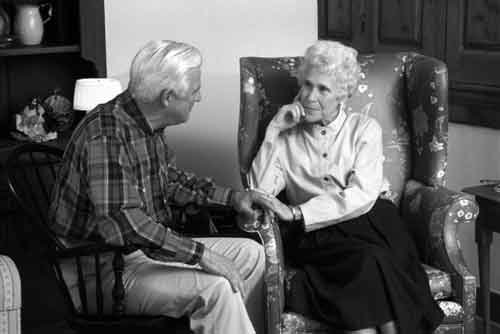Author Janet Belsky says that sensory losses are among our
top-ranking anxieties about old age. This column is written in an
effort to curb those anxieties. We have explored four out of five
senses and this week, we will talk about touch.
Author Janet Belsky says that sensory losses are among our top-ranking anxieties about old age. This column is written in an effort to curb those anxieties. We have explored four out of five senses and this week, we will talk about touch.
Jon Nussbaum, author of “Communication and Aging”, reports that touch is essential to human and relational development, and even the success of health care regimens. Authors Mark Knapp and Judith Hall agree. They add that touch is not only a crucial aspect of most human relationships, but that tactile communication is probably our most basic or primitive form of communication.
Our familiarity with touch begins in the womb with our mother’s heartbeat; we can feel it. After we are born, we rely on our parents or caregivers and this dependence requires constant touch: rocking, kissing, feeding, burping, diaper changes, bathing and swaddling. All of this communicates security and comfort. As infants begin to crawl and progress, the amount of parental touch and contact begins to decline. The child is becoming independent and the parents allow that independence to flourish. This natural occurrence appears to be the biggest factor influencing the decrease in child/parent touching over time especially during that tumultuous period known as adolescence.
Dating during high school and college introduces an entirely new type of touch to young adults; intimate touch between love interests. As we progress through adulthood, our knowledge of intimacy progresses too. So much so, that Knapp and Hall report that for intimates in long established romantic relationships, the quality of touch has likely replaced the quantity of touch since the relationship has been established as an intimate one.
What happens as we continue to age, after we’ve been married for years and have raised our children? What happens well into our 70s, 80s and 90s?
Our experiences with touch begin to wax and wane again, similar to that period between infancy and adolescence; security, comfort, dependence and independence are the common factors yet again.
The loss of a spouse or partner may elicit loving touches from our family and friends during and well after our grieving period. While this physical support is appreciated and offers comfort, nothing can replace the security and reassurance one is accustomed to after sleeping next to someone each night for 60 plus years. It is a feeling that may have unintentionally been taken for granted, but once lost, widows and widowers realize how much it meant to them.
A decline in health and/or loss of independence will also increase our experience with touch. There is usually an increase in loving touches from supportive friends and family members when we are ill or injured. For elders who do not recover quickly, touches from doctors, nurses and other medical professionals may be needed everyday in hospitals or nursing homes. Nussbaum reports that touch in clinical settings is underutilized by medical professionals, but is particularly important because people’s social contacts have changed and they are scared and nervous.
Unfortunately, medical professionals caring for our elders are often overworked and too busy to provide them with more than task oriented touching when we come full circle; dependent on others for feeding, diaper changes, bathing and swaddling. This task oriented touching becomes a constant reminder to the elderly person that they have lost their independence. Even though they can no longer physically care for themselves, some of our seniors who need around the clock care can remember when they were able to do all of these things without assistance.
Knapp and Hall say that the use of touch to communicate messages to the elderly may be crucial, particularly as the reliance on verbal messages wanes. They go onto say that it makes a big difference whether this increased touching is merely professional or expresses affection.
My first experience with the positive affects of touch in a clinical setting occurred more than 10 years ago and an “ah-moment” came to me while I was writing this column. I was working at a nursing home in Hollister while earning my certified nursing certificate through Gavilan College. One of my patients was confined to bed and unable to speak. She looked mean and I was scared of her at first. I asked her if she wanted a manicure, she declined with a nod but agreed when asked if she wanted lotion applied to her hands and arms. Her hands were very cold.
As I massaged the lotion into her skin, her whole persona changed. Her eyes became very bright and she was smiling; she almost looked like a child. We continued to hold hands after the massage. She pointed to the rings I wore and I told tell her who they were from and what they were for. I realized this week that I was communicating to her that she was significant; she and I were two physical beings and our touch solidified that we were very present and very real.
If you have an idea for a topic you’d like to see covered in a future Senior Crossing column, please e-mail Danielle at da*********@*****on.net.











